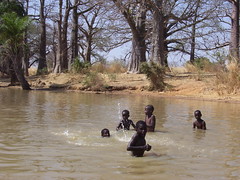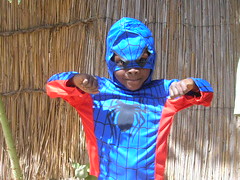What's in a name?
He planned for months, got the thousand requisite shots, had his flight rerouted due to a death on the plane, travelled the dusty road, crossed two ferries, lugged an enormous, bulging suitcase into the compound which got snatched up by my smiling other family, and the first thing my host father proudly said was, "We will call him Ebrima." It might as well have been the lion king, Mustapha (of which I know plenty, it's a popular name) holding a baby Simba (I know one of those too... weird) up over the mountain top, except this was my adoptive father naming my actual father and the moment was most entertaining to me with my foot in both worlds.
I didn't have time to tell Dad about the importance of names here, the way we respond to greeting with a person's last name, and, if possible, citing its historical praise. But here was my father, being called something he couldn't pronounce- Ebrima, Ibrahima, Abraham, a good choice for my confused and bearded dad. But Dad's name was relatively less strange than some...
Here are a few of my favorite names around the village:
Fayi (Throw him/her)
Musukeebaa (Old woman)
Manlafi (I don't want him/her)
Wontonding (Little Giraffe)
Sunkaribaa (Big month of fasting)
Bojang (leave this place)
There's a few I enjoy just for the sound of them: Dudu, Banka, Fanta, I know a woman named Fatou Fatty. And she's gorgeous. I love it.
I didn't have time to tell Dad about the importance of names here, the way we respond to greeting with a person's last name, and, if possible, citing its historical praise. But here was my father, being called something he couldn't pronounce- Ebrima, Ibrahima, Abraham, a good choice for my confused and bearded dad. But Dad's name was relatively less strange than some...
Here are a few of my favorite names around the village:
Fayi (Throw him/her)
Musukeebaa (Old woman)
Manlafi (I don't want him/her)
Wontonding (Little Giraffe)
Sunkaribaa (Big month of fasting)
Bojang (leave this place)
There's a few I enjoy just for the sound of them: Dudu, Banka, Fanta, I know a woman named Fatou Fatty. And she's gorgeous. I love it.


